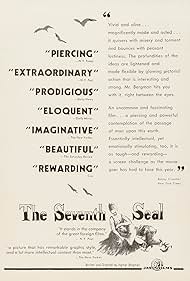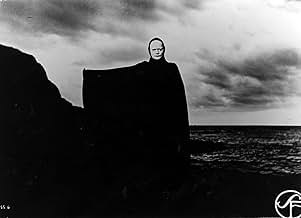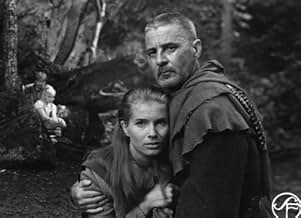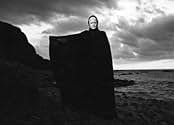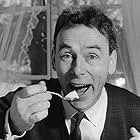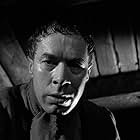A knight returning to Sweden after the Crusades seeks answers about life, death, and the existence of God as he plays chess against the Grim Reaper during the Black Plague.A knight returning to Sweden after the Crusades seeks answers about life, death, and the existence of God as he plays chess against the Grim Reaper during the Black Plague.A knight returning to Sweden after the Crusades seeks answers about life, death, and the existence of God as he plays chess against the Grim Reaper during the Black Plague.
- Awards
- 9 wins & 2 nominations total
Siv Aleros
- Flagellant
- (uncredited)
Sten Ardenstam
- Knight
- (uncredited)
Harry Asklund
- The Landlord
- (uncredited)
Benkt-Åke Benktsson
- Merchant at the Inn
- (uncredited)
Summary
Reviewers say 'The Seventh Seal' delves into mortality, faith, and existential questions through its medieval setting. The chess game with Death symbolizes humanity's struggle against fate. Themes of societal chaos and religious fervor are depicted through plague, witch burnings, and flagellants. Characters like the knight, squire, and actors provide varied perspectives on life and death, enriching the narrative. The film's allegorical approach resonates with contemporary audiences, highlighting the timeless nature of its themes.
Featured reviews
The mysteries of religion and death have long been a popular focus among artists of all media, including film. And while many films question these mysteries, they seldom provide any real insight into the world of the unknown. In Ingmar Bergman's THE SEVENTH SEAL, these mysteries are not only questioned; they are dissected, splayed, and scrutinized.
THE SEVENTH SEAL could very well serve as sort of a manifesto for existentialism. Its deep acuity and haunting imagery is powerful enough to jar even passive viewers out of their complacency and force them to examine their own reality. The delicately crafted story centers around a 14th century knight named Antonius Block and his ongoing game of chess with a shadowy, hooded figure: Death. Bergman uses this allegory not just to personify death, but to illustrate the lengths man will go to in order to avoid it. In the end, however, Death is a much better player than any of us, and though he may humor some of his opponents by letting them think that they have the advantage, the end result is inevitable: Death always wins. No matter how skillfully we plan our moves or how determined we are to win, we can never beat Death.
In Antonius's search for answers, he encounters a variety of very unique characters, each with their own outlook on life, death, faith, fear and love. Their commentary on such matters is often dryly funny and always brilliant, continuously and effectively challenging our perceptions of the world around us. For me, the dialogue was definitely the high point of the film, as it was extremely thought-provoking and carefully constructed throughout. Almost every line spoken is, in one way or another, daunting and unforgettable. Jöns's description of love as "the blackest of all plagues" is a quote that will forever be engraved in my mind.
THE SEVENTH SEAL truly is a remarkable accomplishment in the world of cinema. It is a deep, mesmerizing, and darkly beautiful work of art. More importantly, THE SEVENTH SEAL is one of those rare movies that doesn't just entertain, but also has the power to change the way one thinks.
THE SEVENTH SEAL could very well serve as sort of a manifesto for existentialism. Its deep acuity and haunting imagery is powerful enough to jar even passive viewers out of their complacency and force them to examine their own reality. The delicately crafted story centers around a 14th century knight named Antonius Block and his ongoing game of chess with a shadowy, hooded figure: Death. Bergman uses this allegory not just to personify death, but to illustrate the lengths man will go to in order to avoid it. In the end, however, Death is a much better player than any of us, and though he may humor some of his opponents by letting them think that they have the advantage, the end result is inevitable: Death always wins. No matter how skillfully we plan our moves or how determined we are to win, we can never beat Death.
In Antonius's search for answers, he encounters a variety of very unique characters, each with their own outlook on life, death, faith, fear and love. Their commentary on such matters is often dryly funny and always brilliant, continuously and effectively challenging our perceptions of the world around us. For me, the dialogue was definitely the high point of the film, as it was extremely thought-provoking and carefully constructed throughout. Almost every line spoken is, in one way or another, daunting and unforgettable. Jöns's description of love as "the blackest of all plagues" is a quote that will forever be engraved in my mind.
THE SEVENTH SEAL truly is a remarkable accomplishment in the world of cinema. It is a deep, mesmerizing, and darkly beautiful work of art. More importantly, THE SEVENTH SEAL is one of those rare movies that doesn't just entertain, but also has the power to change the way one thinks.
Death, Death, Death. No matter the moves you make, Death will, in time, have you in checkmate. The Seventh Seal is a rightfully highly regarded film. It is a unique film, and unlike any I have ever seen. I have just finished my second viewing of the film. I have watched several Bergman films since I first saw this, but this is the one that has always stuck out to me the most. I would describe it as a dark and powerful film. There is nothing lacking in this film, in my opinion. The soundtrack is perfectly subtle, acting is agreeable, cinematography fitting and well done, etc. My favorite aspect of this film is simply the premise. A game of chess that is a matter of life and death. If nothing else, that concept is enough to make an interesting film at the very least. Death is the most persistent theme throughout the film, and is often juxtaposed to stark scenes of life, often quickly and without warning. This film was one of the first I watched in my everlasting pursuit of classic cinema, and I would readily recommend it as a starting point for anyone interested in classic or foreign films. Bergman will not disappoint in this one or elsewhere in his filmography. This is probably his most famous and accessible films. This is a staple of classic cinema, watch it and find out why.
Painting a grim portrait of the western world plagued by the Black Death, threading together several norms of the medieval era into a single setting, and addressing its themes by observing them through contemporary lens, The Seventh Seal is a fable of life, death, religion, faith & existential angst that, despite the allegorical treatment, makes sure its narrative remains somewhat accessible.
Written & directed by Ingmar Bergman, one of the first things that stands out about this sermon is the dark & deathlike atmosphere the plot comes drenched in. Add to that, the whole premise of playing chess against the Grim Reaper with one's life on the line sounds interesting on paper. The story however piles on more subplots and digs deeper into the philosophical & spiritual elements that only slow down the ride.
The crisp black n white cinematography is captivating throughout. Characters of all moods are present in the picture. The period details may not be appropriate but the gloomy aura is finely captured. And comfortably steering the film past the finish line are the sturdy performances, led by Max von Sydow who plays a knight locked in a game with Death itself, latter personified by Bengt Ekerot. And the scenes between the two are easy standouts.
Overall, The Seventh Seal is actually easier to navigate than what I was expecting, and the parallels viewers can draw between the medieval pandemic and one we're dealing with currently makes the journey rather intriguing. Nonetheless, the relaxed pace & numbing speeches still made it a frustrating sit for me and failed to strike an emotional chord. As is the case with previous Bergman entries, I do get its legacy & repute but don't feel any personal love for it.
Written & directed by Ingmar Bergman, one of the first things that stands out about this sermon is the dark & deathlike atmosphere the plot comes drenched in. Add to that, the whole premise of playing chess against the Grim Reaper with one's life on the line sounds interesting on paper. The story however piles on more subplots and digs deeper into the philosophical & spiritual elements that only slow down the ride.
The crisp black n white cinematography is captivating throughout. Characters of all moods are present in the picture. The period details may not be appropriate but the gloomy aura is finely captured. And comfortably steering the film past the finish line are the sturdy performances, led by Max von Sydow who plays a knight locked in a game with Death itself, latter personified by Bengt Ekerot. And the scenes between the two are easy standouts.
Overall, The Seventh Seal is actually easier to navigate than what I was expecting, and the parallels viewers can draw between the medieval pandemic and one we're dealing with currently makes the journey rather intriguing. Nonetheless, the relaxed pace & numbing speeches still made it a frustrating sit for me and failed to strike an emotional chord. As is the case with previous Bergman entries, I do get its legacy & repute but don't feel any personal love for it.
Antonius Block - "Who are you?" Death - "I am Death." Antonius Block - "Have you come for me?" Death - "I have long walked by your side." Antonius Block - "So I have noticed."
The Seventh Seal, considered by some to be Ingmar Bergman's greatest achievement, is the desperate prayer of a sensitive, introspective, and insightful young man confused by the horrors of the world around him. Ingmar Bergman's films are often very deep, full of symbolism, philosophy, spirituality, emotion, and thought. The Seventh Seal is classic Bergman. Expressing his fear of life with no meaning, death with no understanding, and faith with no validity, Ingmar Bergman takes us deep into the well of his mind.
As the Black Plague ravages the world, a Antonius Block and his squire, Jons (Max Von Sydow and Gunnar Bjornstrand, respectively), return from fighting in the Crusades. They find their homeland devastated by the plague, their countrymen mad with fear, and their cause lost. Antonius Block is confronted by Death (Bengt Ekerot). Block challenges Death to a game of chess to provide him time to seek answers to the questions that plague his mind as Death has plagued his country. Death accepts, knowing that Block cannot escape his fate, and the two begin their game. As the story continues, Block and Jons meet with several testaments to the agony that the Black Death has brought upon their land. They find a young girl who is to be burned at the stake for having been with the Devil. They find madness in the eyes of all they meet, as everyone is convinced that God is angry and is punishing the world with the plague. They also find a small group of travelling actors, who appear to be the only souls to have remained sane in the midst of all of the death and fear. Block and Jons move across the countryside in the hopes of finding safety in Block's castle, but Death is always around the corner, biding his time.
Brilliantly conceived, and stunningly executed, Bergman's vision is brought to the screen through Gunnar Fischer's powerful cinematography creating images that will likely remain with you for the rest of your life. Strong performances from everyone involved bring humanity to the film. Max Von Sydow's brave and conflicted Antonius Block matching wits with Bengt Ekerot's sinister, omnipotent Death is a microcosm of the forces at work in this breath-taking interpretation of the mortal struggle.
A masterpiece!
The Seventh Seal, considered by some to be Ingmar Bergman's greatest achievement, is the desperate prayer of a sensitive, introspective, and insightful young man confused by the horrors of the world around him. Ingmar Bergman's films are often very deep, full of symbolism, philosophy, spirituality, emotion, and thought. The Seventh Seal is classic Bergman. Expressing his fear of life with no meaning, death with no understanding, and faith with no validity, Ingmar Bergman takes us deep into the well of his mind.
As the Black Plague ravages the world, a Antonius Block and his squire, Jons (Max Von Sydow and Gunnar Bjornstrand, respectively), return from fighting in the Crusades. They find their homeland devastated by the plague, their countrymen mad with fear, and their cause lost. Antonius Block is confronted by Death (Bengt Ekerot). Block challenges Death to a game of chess to provide him time to seek answers to the questions that plague his mind as Death has plagued his country. Death accepts, knowing that Block cannot escape his fate, and the two begin their game. As the story continues, Block and Jons meet with several testaments to the agony that the Black Death has brought upon their land. They find a young girl who is to be burned at the stake for having been with the Devil. They find madness in the eyes of all they meet, as everyone is convinced that God is angry and is punishing the world with the plague. They also find a small group of travelling actors, who appear to be the only souls to have remained sane in the midst of all of the death and fear. Block and Jons move across the countryside in the hopes of finding safety in Block's castle, but Death is always around the corner, biding his time.
Brilliantly conceived, and stunningly executed, Bergman's vision is brought to the screen through Gunnar Fischer's powerful cinematography creating images that will likely remain with you for the rest of your life. Strong performances from everyone involved bring humanity to the film. Max Von Sydow's brave and conflicted Antonius Block matching wits with Bengt Ekerot's sinister, omnipotent Death is a microcosm of the forces at work in this breath-taking interpretation of the mortal struggle.
A masterpiece!
THE SEVENTH SEAL is a film that presents a dramatic fantasy game between meaning of life and fear of death. A knight and his squire have returned to their country after a ten-year crusade. Deadly disease ravaged country. Knight faces Death. He calls Death on the multi-day game of chess...
The story has touched serious philosophical and religious topics. However, the story is full of intrigue, dark humor and hope. The protagonists are distracted between the vicious disease, self-pity and torture. It is interesting to see a deeply disillusioned knight, a cynical squire who hates women, a cheating wife, evil priests, a mute girl and seemingly healthy and happy family on the same road. The truth is all around them. The main protagonist used to persistently ask questions to which only he has a valid response. This film reveals some controversial issues. Is deadly disease greater threat to man or the man is the greatest enemy to himself? Mr. Bergman has painted realistic effects of fear, horror, cynicism, surprises, love and health on human faces.
Max von Sydow as Antonius Block, the knight is a more serious version of Don Quixote. Gunnar Björnstrand Jöns, the squire is a character who never changes his mood. He always has some sort of cynical jokes or words of contempt for each occurrence. Bengt Ekerot is Death in the true sense of that word. Nils Poppe as Jof is a juggler who has strange predictions. Fortunately, no one believes him. Bibi Andersson as Mia, Jof's wife is a beautiful and cheerful woman who does not fit into the landscape.
Life is a hard journey. The rare moments of happiness are a sort of salvation. The end of the film emphasizes the transience of life and the power of death which no one can escape. Of course, only in the eyes of one of the protagonists.
The story has touched serious philosophical and religious topics. However, the story is full of intrigue, dark humor and hope. The protagonists are distracted between the vicious disease, self-pity and torture. It is interesting to see a deeply disillusioned knight, a cynical squire who hates women, a cheating wife, evil priests, a mute girl and seemingly healthy and happy family on the same road. The truth is all around them. The main protagonist used to persistently ask questions to which only he has a valid response. This film reveals some controversial issues. Is deadly disease greater threat to man or the man is the greatest enemy to himself? Mr. Bergman has painted realistic effects of fear, horror, cynicism, surprises, love and health on human faces.
Max von Sydow as Antonius Block, the knight is a more serious version of Don Quixote. Gunnar Björnstrand Jöns, the squire is a character who never changes his mood. He always has some sort of cynical jokes or words of contempt for each occurrence. Bengt Ekerot is Death in the true sense of that word. Nils Poppe as Jof is a juggler who has strange predictions. Fortunately, no one believes him. Bibi Andersson as Mia, Jof's wife is a beautiful and cheerful woman who does not fit into the landscape.
Life is a hard journey. The rare moments of happiness are a sort of salvation. The end of the film emphasizes the transience of life and the power of death which no one can escape. Of course, only in the eyes of one of the protagonists.
Storyline
Did you know
- TriviaIngmar Bergman credited the film with helping him overcome his crippling fear of death. Because the film dealt so overtly with the subject, he found it a highly cathartic experience.
- GoofsThe chess players focus on capturing the Queen. The Queen was not a super-powerful piece until centuries later when a recent chess-variant initially called "chess of the mad queen" became more popular than the classic game.
- Quotes
Antonius Block: We must make an idol of our fear, and call it god.
- ConnectionsEdited into Severed Ways: The Norse Discovery of America (2007)
Details
- Release date
- Country of origin
- Languages
- Also known as
- El séptimo sello
- Filming locations
- Hovs Hallar - Naturreservat, Skåne län, Sweden(Opening beach scene and ending scene)
- Production company
- See more company credits at IMDbPro
Box office
- Budget
- $150,000 (estimated)
- Gross worldwide
- $311,212
- Runtime1 hour 36 minutes
- Color
- Aspect ratio
- 1.37 : 1
Contribute to this page
Suggest an edit or add missing content

